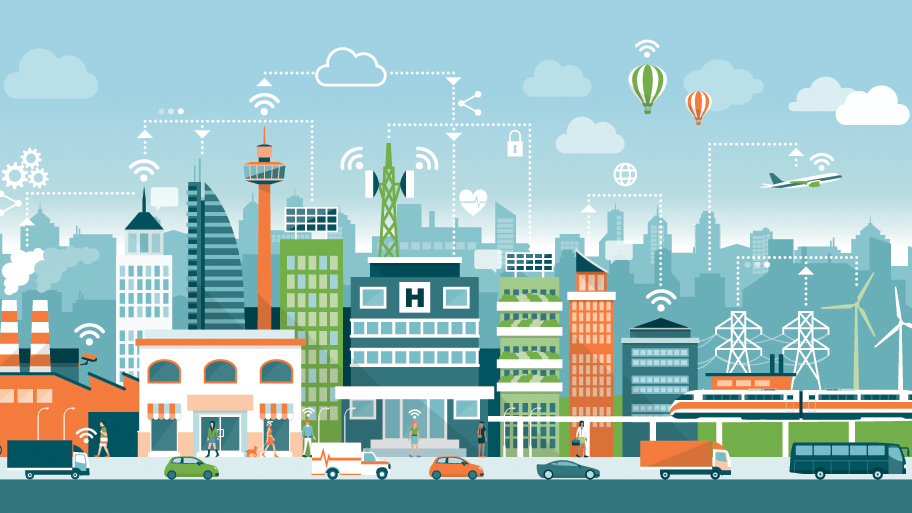Smart Cities: Living in intelligent spaces
As communications networks expand and the built environment becomes intelligent, how will smart cities provide new ways of living and working?


While the smart city has been developing for decades, it’s only recently that it has started to come into its own. Pervasive connectivity, where every object in the built environment has intelligence and – more crucially – can ‘talk’ to each other, is about to see massive expansion. The twin technologies of 5G and Internet of Things (IoT) will deliver cities that are live environments we can all move through, where every aspect of city life is impacted by high-speed data connectivity.
Dominique Bonte, vice president of end markets and verticals at ABI Research, tells IT Pro: "In the context of the smart city, 5G will deliver more capacity. This is often forgotten with faster data transmission speeds being the focus when 5G is discussed. More capacity is vital to realise the promise of the smart city.
“As cities are dense conglomerates of people and objects, the connectivity that is needed must be seamless and intuitive. The cell structure we have at the moment for smartphone connections will have to take a quantum leap in density. Large scale 5G networks will appear in cities first as these spaces offer a controlled built environment that can have large numbers of devices connected together.”
For the users of a smart city, the core services such as transport rely on the gathering and analysis of vast quantities of data. The smart city is a data city. When the environment people move through is intelligent, services and applications – delivered via mobile devices – take a massive step forward in functionality. Released from the shackles of low bandwidth, smart cities embrace the low latency 5G networks will provide.
Building intelligence
The value that smart cities can deliver to their municipalities and citizens alike is driving high returns on the investments being made in the digitisation of their infrastructures.
In November 2019, ESI ThoughtLab unveiled the findings of its 2019 Smart City Research Initiative, Building a Hyperconnected City. According to the study, 38% of cities deploying smart mobility solutions have boosted customer satisfaction, while 32% are improving productivity and delivery times for business. When it comes to cities that have implemented intelligent environmental and energy initiatives, 45% said they are improving citizen health, while 44% said they are reducing pollution, and 43% are stabilising energy prices.
“Becoming a smart city is no longer enough, particularly if public leaders expect to keep citizens on board,” the report concludes. “To unlock the full economic, social, environmental, and business value from technology, cities need to morph into hyperconnected urban centres”
Get the ITPro daily newsletter
Sign up today and you will receive a free copy of our Future Focus 2025 report - the leading guidance on AI, cybersecurity and other IT challenges as per 700+ senior executives
Teodora Kaneva, programme manager for SmarterUK at TechUK, tells IT Pro: “We see technology as a building block of a smart city but also central to meeting net-zero carbon targets as well. The technologies of the Fourth Industrial Revolution – particularly 5G, IoT and AI – will provide essential tools for increasing efficiency in the economy and preparing society for a post-fossil fuel world.
“Digital technology can cut global emissions by at least 15% and as much as 24% of UK emissions by 2030. This can be compared to the sector’s own UK footprint of 2.3%, which is predicted to decline 1.97% by 2030. This would deliver an additional £122 billion in annual economic benefit to the UK, comprising £58.5 billion in additional ICT and stakeholder revenues and £63.5 billion in cost saving opportunities. The sector is also the world’s largest purchaser of renewable energy – most effectively through Power Purchasing Agreements (PPAs) – making it an important anchor customer for renewables.”
Smart cities will also deliver masses of opportunities for businesses. Management consultancy McKinsey, in its report, explains: "For companies, smart cities represent major business opportunities, given that some of the world's urban markets are larger than entire nations. To partner with cities and operate effectively there, companies will need to adopt the mindset of serving people, not just a market. They may be able to find new business models by looking for specific ways to help cities deliver a better quality of life. Even companies that are not smart city providers may be affected by the way urban ecosystems evolve, and they may need to alter the way they do business in response.”
Ambient connectivity
One of the core values of the smart city is its ability to deliver information in real-time. When objects within a city are enabled with sensors, the vast quantities of data, these devices can collect will be analysed to deliver services and insights.
A great example is the ‘electric avenue’ developed by Siemens in collaboration with Westminster City Council, where existing lamp posts have been converted into electric vehicle (EV) charging stations. The initiative showcases a shift in attitudes towards EVs that the capital of the UK is experiencing. Data shows that the vast majority of motorists in central London (80%) believe it is ‘very important’ that air quality is improved, and an even higher proportion, 83%, are more concerned about their carbon footprint now than they were in 2015. This isn’t just warm sentiments with no action either, as Westminster has seen a 40% growth in EVs charged in the borough during 2019.
“In a city that suffers from some of the worst air pollution in the country, we need to be supporting the change to green technology as much as we can. ‘Electric Avenue, W9’ gives us a glimpse into the future of streets in Westminster, where we hope to provide the infrastructure needed for our residents to make the switch to cleaner, greener transport,” said Andrew Smith, Westminster City Council Cabinet Member for Environment & Highways, at the launch of the initiative.
Hull City Council, meanwhile, is going even further by creating a CityOS. Using the Cisco Kinetic for Cities platform, the city is now able to collect and aggregate data from a range of sensors to manage and deliver a range of services.
Deputy leader of Hull City Council, Daren Hale, said: “Developing Hull as a smart city will give us the opportunity to work with public and private sector partners to deliver real benefits to communities, businesses and visitors to Hull. The project will involve innovative technological solutions to enhance data sharing and decision making, which will help us to deliver more effective services, including everything from traffic management to health and social care.”
Intelligent spaces
The approaches taken to creating a smart city will be manifold. Speaking to IT Pro, Ian West, head of TMT at KPMG UK explains: “The key industries really need to think in a very different way when it comes to networks because the potential profitable associated benefits can most certainly extend further than to mobile network operators (MNOs) only – saying that the MNOs should commercialise hypothetical use cases into compelling business cases for their sector customers across healthcare, insurance or facilities management. New revenue streams can surely be built through launching B2B partnerships with those adjacent sectors.
"When it comes to the challenges associated with these technologies, these vary on a global scale. In the UK, a key B2C concern is a fact that operators haven't yet got a real grasp of how much extra the consumer will be willing to pay for superior 5G bandwidth, capacity and lower latency for benefits in areas such as gaming. And it will be hard to ascertain because, for your day to day functionality, 4G will continue to serve consumers well.”
The challenges facing network operators, city leaders and the myriad of device developers is to work in unison to deliver the city-wide services needed to provide smart cities.
David Fraser, tech specialist at Intel outlines the challenges: “IoT developers will face many challenges creating and deploying IoT solutions in smart city environments. The key challenge facing IoT developers is connecting the myriad of sensors, cameras, gateways and other devices. This will only be solved by ubiquitous and robust communications technology such as 5G.
“Navigating the plethora of standards and ensuring interoperability between different devices adhering to different protocols will present a further hurdle to those developing our smart cities. However, once these challenges are overcome, the final challenge will be around administration and dealing with various authorities to deploy and gain access to sites and utilise existing street furniture. With 32 boroughs in London alone, the deployment of IoT would likely need to be negotiated borough by borough to ensure the relevant permission requirements for streetscape are adhered to.”
Will smart city users be happy to relinquish even more control over their personal data to give them access to the new connected services that characterise intelligent cities, though? ABI Research's Dominique Bonte thinks privacy will be impacted."Smart cities will rely upon the use of data collected from individuals. Their privacy but also their desire to use the new services the smart city will deliver will have to be balanced.”
she adds: "We can already see this with the current COVID-19 crisis. In China, every citizen's phone is tracked. This allowed China to very accurately track the spread of the virus. This level of tracking may be used by default in China. Still, regulations and legislation that protects privacy in other countries may prevent some of the technologies smart cities could offer from actually being realised."
The smart city is in active development. As 5G rolls out and IoT becomes ubiquitous, smart environments become a product of the intelligent environments these technologies deliver. Flying cars and teleportation may not be the future of the city, but high-speed connectivity delivering efficient and safe services certainly is
David Howell is a freelance writer, journalist, broadcaster and content creator helping enterprises communicate.
Focussing on business and technology, he has a particular interest in how enterprises are using technology to connect with their customers using AI, VR and mobile innovation.
His work over the past 30 years has appeared in the national press and a diverse range of business and technology publications. You can follow David on LinkedIn.
-
 Should AI PCs be part of your next hardware refresh?
Should AI PCs be part of your next hardware refresh?AI PCs are fast becoming a business staple and a surefire way to future-proof your business
By Bobby Hellard
-
 Westcon-Comstor and Vectra AI launch brace of new channel initiatives
Westcon-Comstor and Vectra AI launch brace of new channel initiativesNews Westcon-Comstor and Vectra AI have announced the launch of two new channel growth initiatives focused on the managed security service provider (MSSP) space and AWS Marketplace.
By Daniel Todd